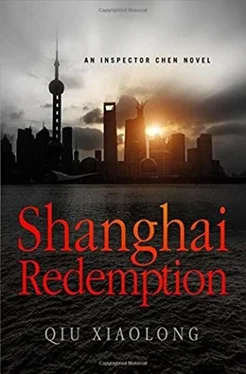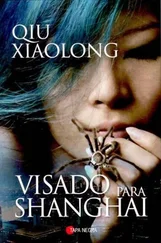“Continue to sing every Tuesday as before, but during the rest of the week, you can work as a hostess and get paid accordingly. You’ll also get free food and board, and a bonus whenever you sing for customers by special request.”
To Qian, Suzhou opera could not have sunk lower. But the rapidly rising rent in the city already took more than half of the money she earned. She had no choice but to move into the restaurant-eating leftovers in the kitchen and sleeping on the hard tables after the restaurant closed late at night.
About a week after starting her new role, she was told that there would be a group of distinguished Western tourists interested in Suzhou opera coming in that evening and that she had to do her best. That evening turned out to be a huge success. Articles covering it appeared in several newspapers, some with pictures, and among the tourists was a well-known American sinologist who spoke highly of the Shanghai government’s efforts to support the local dialect opera. For Kang, publicity like that meant more profit.
For her, however, it was more about a man whom, for the moment, she would call S. He was the one who arranged for the Western tourist group to visit the restaurant, initially as a gesture of support for the traditional art. He was in a position to make decisions for the Shanghai Foreign Liaison Office, and he arranged for several groups to come in quick succession.
In S., she saw “someone who understands the music,” an echo from the traditional romantic stories celebrated in Suzhou opera. And S. saw her as “the youthful, vivacious embodiment of the ancient art,” as he told her one evening after her performance. In him, she thought she’d discovered hope for a revival of Suzhou opera. He had the power to make impossible things possible. Because of the groups of foreign tourists who came to the Suzhou opera at the restaurant, and the coverage of it in the media, the opera started to attract some younger people.
All of this happened during a vulnerable time for her. She’d been in Shanghai for nearly a year, with very little to show for it. Her grandma had passed away back in Suzhou, worrying on her deathbed about her granddaughter. Qian was starting to wonder if there was any point in struggling any longer.
That was when S. stepped into the restaurant, and then, into her life. He brought with him flowers, red envelopes, and promises to make her a star in the revival of Suzhou opera. He was generous, though he might not have had to worry about the money, since it was all done under the cover of government business. He told her that he and his wife were separated and that they had filed for divorce. It wasn’t long before he arranged for her to move into a furnished apartment in Xujiahui. He even managed to secure her a “research subsidy for Suzhou opera,” which would be conducted under aegis of the Shanghai Foreign Liaison office.
What happened between the two of them seemed to be one of those old, yet always new, stories.
He told her that she didn’t have to perform anymore-she didn’t need the money, but she still went to the restaurant once a week. He was a busy official, so when he wasn’t around, she worked on recording the CD of Tang poems as part of her research into Suzhou opera.
But that phase of the relationship didn’t last very long. While S. tolerated her continuing to perform, he no longer brought foreign groups to the restaurant. He said that some people were already starting to gossip, and it was getting difficult to see her as much as he would have liked.
So he proposed that she move back to Suzhou. There he would visit her whenever possible, and they wouldn’t have to worry about being recognized. He bought an apartment for her there, and instead of a research subsidy through his department, he gave her a monthly allowance. Suzhou had more important appeal for her: she still had her position in the opera ensemble, and she hoped she might be able to do something more for the opera there. Not to mention the fact that she would be closer to her parents.
She accepted the seemingly reasonable arrangement, but she soon realized that it was something else entirely. He cared for his career more than he cared about anything else, and he wasn’t exactly separated from his wife, who was in the United States with their son while he attended private school. But what could an ex-Suzhou opera singer do? Still, Suzhou held something unexpected for her-a new Suzhou opera club, whose members were devoted fans, and to which she was a welcome addition.
Then she started to notice that S. had changed. He didn’t seem to be that crazy about her anymore. One evening, he even joked that when she was singing in her mandarin dress in Shanghai, she was animated with an irresistible glow, but here in Suzhou, she looked like any ordinary Suzhounese.
Shortly afterward, she found out that he had a new conquest in Shanghai, who was apparently younger and prettier. Qian was devastated by the realization that he’d sent her back to Suzhou to get her out of the way. Yet he still continued to come see her, though less and less, and to provide for her just as handsomely as ever.
Another devastating blow came from her parents. Initially, they were confused by the fact that she’d come back to Suzhou without a job, yet with very comfortable means. When they found out about the ernai arrangement with S., they refused to step into her apartment again.
Then an opportunity presented itself. The American professor who’d been part of the first group led by S. offered her a spot in his university’s Asian studies program. He even offered her a tuition waiver, so that all she’d need would be the money to support herself. He suggested she could support herself by giving performances, but she doubted there would be enough Suzhou opera fans in the local Chinese community.
So she approached S. He was going to get rid of her anyway, this could be a kind of severance pay, she supposed. To her surprise, S. was furious. He thought that once she was out of China, she would start talking and damage his career. He forbade her from pursuing the opportunity any further and, through his connections, had her travel permit rescinded.
“Things can’t go on like this,” she concluded, switching back to the first person. “I was considering starting over in another country when we met near the cemetery.”
She spoke in an amiable, soft Suzhou dialect, as if this were some sort of a theater performance.
Whether she was a reliable narrator or not, he wasn’t sure. There was probably some self-justification woven into her story. Still, her story was probably not that different from those of other ernai, with the exception of her passion for Suzhou opera. If for no other reason than that, she deserved help.
He saw a parallel with his own passion for poetry, except that he was far more realistic.
She went on with a catch in her voice, “ He only sees the new one laugh, / but hears not the old one weep. ” It sounded like another Tang couplet.
“He’s not worth it,” he said. “Start over, but start over here-and start over for yourself.”
“It’s not that I haven’t tried. But since my only skill is singing, it’s difficult to find a real job in Suzhou. Besides, people have already started telling stories about me. So the prospect of studying abroad is very tempting.”
“It’s tough,” he said, nodding.
“If only things could be just like when we first met-” Qian resumed.
It could be quote from a poem by Nalan Xingde, with a subtle intertextual allusion to a Han dynasty imperial concubine who compared herself to a silk fan that, once used, was forgotten, the memories of her first meeting with her lord now dust-covered.
As compelling as her story was, however, it was disappointing. He’d hoped that she’d be able to help him find out more about the Heavenly World.
Читать дальше












